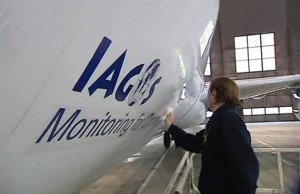- One of our Airbus A340-300s is equipped with a device to sample and measure air quality on Spain-Latin America routes.
- Iberia is world’s 5th airline to participate in IAGOS project, and was chosen because of its leading position on Europe-Latin America routes.
- Iberia’s participation is in keeping with its environmental protection policies.
Madrid, Spain, 2014-3-5 — /Travel PR News/ — Iberia is the first Spanish airline to take part in the IAGOS air quality and composition measurement project, a part of the European Union’s Infrastructures Research Strategy.
The Spanish airline has installed air sampling equipment on an Airbus A340-300 used on Spain-Latin America routes, to measure quantities of H2O, O3, CO, CO2, NOx, and aerosols at high altitudes.
The aircraft will collect and report the data for several years, showing variations over time. The data will also be reported to weather services almost in real time. The IAGOS project is intended to monitor and predict climate change, in order to help design policies. The air sample data furnished by the airlines cannot be collected by satellites or by ground-based weather stations. Iberia corporate development manager Sergio Turrión commented,“our participation in the IAGOS project is an example of Iberia’s major contributions to environmental protection, which include the incorporation of cleaner aircraft and numerous initiatives to reduce harmful emissions and put our business on an increasingly sustainable footing.”
Also participating in the IAGOS project are Lufthansa, China Airlines, Cathay Pacific and Air France. Iberia was chosen because of its prominence on Europe-Latin America routes.
In recent year Iberia’s environmental policies have rested on three main pillars:
- Fleet replacement. New and more efficient aircraft have been key in reducing the airline’s carbon dioxide emissions by 5% since 2009. The company is also actively involved in research projects aimed at obtaining alternative aviation fuel, including one based on microalgae.
- Initiatives in daily operations to cut fuel consumption and atmospheric emissions, by reducing the laden weight of aircraft, optimising routes and cruising speeds, etc.
- Customer-based initiatives, such as the CO2 calculator application, which informs customers of the magnitude off their “carbon footprint” as passengers on a given flight, and invites them to offset it by contributing to reforestation projects.


